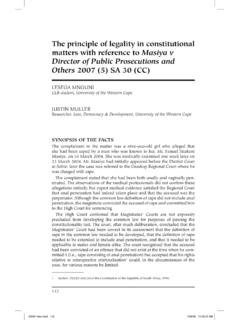Transcription of The Death Penalty and Human Rights
1 The Death Penalty and Human Rights : Death Penalty and International Law by Richard C. Dieter, Executive Director, Death Penalty Information Center Introduction Gradually, in the course of social evolution, a consensus forms among nations and peoples that certain practices can no longer be tolerated. Ritual Human sacrifice is an example; slavery, too, has been largely abandoned; physical torture is widely condemned by most nations. Vestiges of these practices may continue, but those are aberrations that further underscore the fact that the world has turned against these practices. A majority of countries in the world has now abandoned the use of the Death Penalty . But the world has not yet formed a consensus against its use. The most populous country in the world, China, executes thousands of people every year, and the most powerful country, the United States, uses it regularly. Eighty-four countries retain the use of capital punishment.
2 However, the number of countries employing the Death Penalty is declining and it is possible that worldwide opinion and pressure will gradually influence all countries to abandon this practice. This paper will look at the trend towards abolition of the Death Penalty as it has emerged over recent decades. It will trace the development of capital punishment as a Human Rights issue in the international forum, and examine recent challenges to the Death Penalty in the United States. The debate about the Death Penalty within the does not usually employ the terminology of Human Rights . Nevertheless, the use of the Death Penalty in the Oxford Round Table Death Penalty and International Law, p. 2. intersects with international law and is challenged by it. Using different terms and a different legal analysis, the may be coming to a similar conclusion: the Death Penalty is no longer acceptable in modern society, given what we know about its arbitrariness and mistakes, and given the alternatives that are now in place.
3 The thesis of this paper is that international law and an analysis based on Human Rights are useful means to address the Death Penalty in the Although the uses other terms in protecting basic Rights , and has carefully insulated itself from key Human Rights treaties regarding the Death Penalty , there is now a new openness to discuss the problems of capital punishment. Particularly around the issue of innocence, criticism of the Death Penalty within the and the concerns of the international Human Rights community stand on common ground. If the is headed toward the abolition of the Death Penalty , the next few years will be crucial in determining whether that process is rapid, or drawn out over many decades. The Trend Towards Worldwide Abolition In 1986, 46 countries had abolished the Death Penalty for ordinary Sixteen years later, the number of countries in the same category had almost doubled to Moreover, another 22 countries had stopped using the Death Penalty in practice, bringing the total of non- Death Penalty countries to 111, far more than the 84 countries which retain an active Death Penalty .
4 Roger Hood, in his book about world developments in the Death Penalty , noted that: "The annual average rate at which 1 . See Amnesty International, United States of America: The Death Penalty 228 (Appendix 12) (1987). (exclusive of crimes committed under military law or in time of war) . 2 . See Amnesty International, "Facts and Figures on the Death Penalty ,". Oxford Round Table Death Penalty and International Law, p. 3. countries have abolished the Death Penalty has increased from (1965-1988) to 4 per year (1989-1995), or nearly three times as many."3 International law expert, William Schabas, noted that fifty years ago this topic did not even exist because there were virtually no abolitionist For a world in which the Death Penalty has been practiced almost everywhere for centuries, this is a dramatic turnaround. Although formal abolition of the Death Penalty dates as far back as 1867 for Venezuela and 1870 for the Netherlands, and even earlier for the state of Michigan (1846), most of the movement towards elimination of capital punishment has been fairly Human Rights as a Basis for Abolition and Reform The reasons why countries have abolished the Death Penalty in increasing numbers vary.
5 For some nations, it was a broader understanding of Human Rights . Spain abandoned the last vestiges of its Death Penalty in 1995, stating that: "the Death Penalty has no place in the general penal system of advanced, civilized societies .. What more degrading or afflictive punishment can be imagined than to deprive a person of his life .. ?"6 Similarly, Switzerland abolished the Death Penalty because it constituted "a flagrant violation of the right to life and dignity.."7 Justice Chaskalson of the south african Constitutional Court, stated in the historic opinion banning the Death Penalty under the new constitution that: "The Rights to life and dignity are the (June 2002). 3 . R. Hood, The Death Penalty : A World-wide Perspective 8 (2d edit. 1996). 4 . See Schabas, The Abolition of the Death Penalty in International Law 1 (1997). 5 . See Schabas, note 4, at 5-6. 6 . See Hood, note 3, at 15 (Spain had abolished the Death Penalty for ordinary crimes in 1978).
6 7 . Id. at 14. Oxford Round Table Death Penalty and International Law, p. 4. most important of all Human Rights .. And this must be demonstrated by the State in everything that it does, including the way it punishes criminals." 8. The Human Rights Debate Defining the Death Penalty as a Human Rights issue is a critical first step, but one resisted by countries that aggressively use the Death Penalty . When the United Nations General Assembly considered a resolution in 1994 to restrict the Death Penalty and encourage a moratorium on executions, Singapore asserted that "capital punishment is not a Human Rights issue."9 In the end, 74 countries abstained from voting on the resolution and it failed. Similarly, Trinidad and Tobago, in withdrawing from the Human Rights convention of the Organization for American States and preparing to resume executions, insisted that "The Death Penalty is not a Human Rights issue.
7 "10. However, for an increasing number of countries the Death Penalty is a critical Human Rights issue. In 1997, the High commission for Human Rights approved a resolution stating that the "abolition of the Death Penalty contributes to the enhancement of Human dignity and to the progressive development of Human Rights ."11 That resolution was strengthened in subsequent resolutions by a call for a restriction of offenses for which the Death Penalty can be imposed and for a moratorium on all executions, leading eventually to 8 . Makwanyane and Mchunu v. The State, 16 HRLJ 154 (Const. Ct. of S. Africa 1995). 9 . See Hood, note 3, at 55. 10 . L. Rohter, "In the Caribbean, Support Growing for the Death Penalty ," Times, Oct. 4, 1998, at 14. 11 . United Nations High commission for Human Rights Resolution, (April 3, 1997). 12 . Id. at (Mar. 30, 1998); (April 25, 2001). Oxford Round Table Death Penalty and International Law, p.
8 5. The member states of the Council of Europe have established Protocol 6 to the European Convention on Human Rights calling for the abolition of the Death Similarly, an optional protocol supporting the end of the Death Penalty has been added to the American Convention on Human The European Union has made the abolition of the Death Penalty a precondition for entry into the Union, resulting in the halting of executions in many eastern European countries which have applied for membership. Russia commuted the Death sentences of over 700 people on Death row, and is considering legislative change leading to Poland has voted to end the Death Penalty , as has Yugoslavia, Serbia and Most recently, Turkey moved closer to admission to the European Union when its Parliament voted to abolish the Death Penalty except in times of Challenging the Death Penalty is not seen solely as an internal matter among nations.
9 Many European countries, along with Canada, Mexico, and south Africa, have resisted extraditing persons to countries like the United States unless there are assurances that the Death Penalty will not be sought. The Council of Europe has threatened to revoke the 's observer status unless it takes action on the Death Mexico has recently begun a program to provide legal assistance to its foreign nationals facing the Death Penalty in the As discussed more fully below, 13 . European Treaty Series (ETS) 114 (Protocol 6 to the Convention for the Protection of Human Rights and Fundamental Freedoms, 213 UNTS 221 (1955)). 14 . Organization of American States Treaty Series 73 (Protocol to the American Convention on Human Rights , 1144 UNTS 123 (1979). 15 . See Associated Press, June 3, 1999 (Boris Yeltsin commuted 716 Death sentences). 16 . See Death Penalty Information Center, (visited Aug.))
10 5, 2002). 17 . See "Turkish Parliament, Looking to Europe, Passes Reforms," New York Times (AP), August 4, 2002. Oxford Round Table Death Penalty and International Law, p. 6. these Mexican citizens were usually not afforded their Rights under the Vienna Convention on Consular Relations. This same violation led Paraguay and Germany to pursue relief at the International Court of Justice in the Hague for their foreign nationals facing execution in the The United States, Human Rights , and the Death Penalty The is committed to the pursuit of international Human Rights as evidenced by President Clinton's signing of an Executive Order on the 50th anniversary of the 's Declaration on Human Rights in 1998. The Order stated: It shall also be the policy and practice of the Government of the United States to promote respect for international Human Rights , both in our relationships with all other countries and by working with and strengthening the various international mechanisms for the promotion of Human Rights , including.









